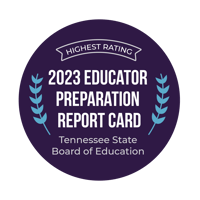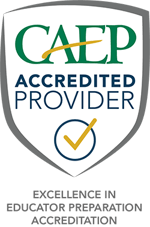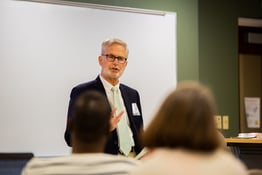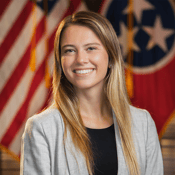Early Childhood Education & ESL
This Bachelor of Science in interdisciplinary studies offers an endorsement in early childhood education (PreK-3) and a secondary endorsement in English as a second language (ESL). The degree prepares students to be competent and compassionate teachers of young students and those with language barriers, providing them with the strong foundation and early intervention they need to excel in learning.
Program Benefits
- Learn from faculty who possess high degrees in their fields, who make an effort to know you personally and who have relevant and valuable real-world experience in both public and private school settings.
- Enjoy our small class sizes and supportive campus community.
- Gain hands-on student teaching experience in both public and private school settings.
What to Expect
Trevecca’s early childhood education and ESL program equips you to work with young students and students with language barriers who can benefit from early intervention. When children have positive support in their early years of schooling, it sets them up for long-term success. As an early childhood and/or ESL educator, you won’t only be providing foundational skills like math, science and literacy, you’ll also be teaching children crucial skills in how to engage socially and emotionally in the world.
This program offers a solid foundation in early education combined with 12 hours of ESL instruction. Coursework covers topics like effective classroom environments; learning through play and expressive creation; education in urban culture; methods of assessment and evaluation for ESL; trends, models and methods in ESL instruction; and linguistics for teachers of ESL. In addition, the courses and content in this program are consistently updated to reflect the ever-changing needs of modern education. Our technology course prepares you to confidently use technology to supplement traditional teaching methods and to present engaging virtual instruction.
This program also offers incredible field experience in a diverse range of learning environments. You’ll acquire 120-140 hours of hands-on experience with student teaching opportunities in both public and private schools. Trevecca has partnerships with both Wilson County Schools and Metro Nashville Public Schools. As part of your field experience, you’ll get valuable feedback from faculty and experienced teachers aimed at helping you improve your teaching craft.
Why Choose Trevecca?
Founded in 1901 and a leader in online education for more than two decades, Trevecca helps students discover and pursue an individual calling by providing innovative instruction; cultivating a supportive, Christ-centered community; and establishing relationships that open doors.
 Recognized nationally and locally for academic quality, Trevecca has earned a reputation for providing the world with servant leaders, problem solvers and difference makers. Trevecca’s holistic approach to education encompasses intellectual, social, emotional, physical and spiritual growth.
Recognized nationally and locally for academic quality, Trevecca has earned a reputation for providing the world with servant leaders, problem solvers and difference makers. Trevecca’s holistic approach to education encompasses intellectual, social, emotional, physical and spiritual growth.
As a Christian university, we offer programs that explore the ways faith intersects with your field of study. This means you can gain your degree in a supportive, Christian community with small classroom sizes and engaged faculty members who care about you and your goals.
 Trevecca’s School of Education degree programs meet the rigorous national standards for education preparation established by the Council for the Accreditation of Educator Preparation (CAEP). CAEP promotes excellence in educator preparation through content and pedagogy, clinical partnerships and practice, candidate recruitment, progression and support, program impact, quality assurance and continuous improvement.
Trevecca’s School of Education degree programs meet the rigorous national standards for education preparation established by the Council for the Accreditation of Educator Preparation (CAEP). CAEP promotes excellence in educator preparation through content and pedagogy, clinical partnerships and practice, candidate recruitment, progression and support, program impact, quality assurance and continuous improvement.
Course Descriptions
Get details on all the courses you’ll complete as you work toward this degree at Trevecca.
Read More- Program specifics
As part of earning a dual endorsement in early childhood education and English as a second language (ESL), Trevecca students receive training in both subject areas to prepare them for early childhood instruction and language intervention.
Coursework covers topics such as effective classroom environments; learning through play and expressive creation; education in urban culture; methods of assessment and evaluation for ESL; trends, models and methods in ESL instruction; and linguistics for teachers of ESL. Students receive a strong foundation in language and literacy instruction, children’s literature, early childhood math, social studies and science methods.
Career Opportunities
Earning a Bachelor of Science in interdisciplinary studies that combines an endorsement in early childhood education (Pre-K-3) with a dual endorsement in English as a second language (ESL) equips graduates to teach students who are in need of both early childhood education and ESL services. Or teachers can choose to focus exclusively on one of these two areas.
Teachers who are recognized for their effectiveness and excellence in the classroom can also get promoted to work as instructional coaches. These are individuals who lead professional development in a school setting, model instruction in classrooms for teacher improvement and serve as mentors for teachers struggling with the responsibilities of today's classroom.
This program also prepares you to earn a master's or specialist degree. Trevecca offers respected advanced degree programs in educational leadership, ESL and accountability and instructional leadership that could open additional professional doors in the field of education.
“When I leave my classes, I feel empowered and capable. I want nothing more than to infuse children with a love for learning and provide a safe environment for that learning to take place. I wholeheartedly believe that Trevecca's Education Department has equipped me with the skills, knowledge, and experience to accomplish those goals.Trevecca holds a special place in my heart, and I am thankful to God for the ways the School of Education views classrooms as mission fields and teachers as change agents.”
Faculty
- Andrew Burnham Director, graduate Master in Arts in Teaching (MAT) program / graduate Special Education: Visual Impairments
- Amy Conditt Director, Post Baccalaureate program / Director, Assessment and Accreditation
- Andrea Fowler Director of Library Services
- Suzann Harris Dean, School of Education
- Beth Purtee Collection Services Librarian
- Priscilla Speer Assistant Professor | Online Learning Services Librarian
- Marcia Walker Director of Clinical Practices and Field Experience
Course Descriptions
Get details on all the courses you’ll complete as you work toward this degree at Trevecca.
Life, Calling, and Purpose
INT 1100
English Composition I
ENG 1020
Emphasizes the recursive writing process through appropriate determination of subject, audience, purpose, and style, with correct usage of grammar, punctuation, and logical organization. Students will use appropriate technologies for writing and learning.
English Composition II: Critical Reading, Writing, and Thinking
ENG 1080
Emphasizes intellectual and analytical reasoning through reading and writing assignments. Includes instruction in library and research technologies and the writing of a research project.
Speech Communication
COM 1010
A study of the principles and practices of effective human communication, with emphasis placed on public speaking. The course emphasizes the critical thinking and skill development necessary for effective speech. Listening skills are included in the study.
Financial Stewardship
BUS 2010
Provides the student with a basic understanding of his or her economic environment and the basic principles and tools of personal financial management. Emphasis will be placed on personal financial planning, including budgeting, managing personal debt, insurance, taxes, investments, and real estate. When possible, topics will be analyzed and discussed from a Christian perspective.
Introduction to Health and Wellness
HPE 1500
Designed to assist the student in their understanding and development of a healthy lifestyle. Emphasis is placed on the components and behaviors that promote lifelong, positive outcomes in the five dimensions of wellness: physical, emotional, intellectual, social, and spiritual. Includes a fitness laboratory component. Fee charged.
Life Science
SCI 1500
A study of biological concepts including the chemistry of life, principles of inheritance, evolutionary theories, biological organization of various organisms, and relationships between organisms and their environment. Issues related to current advances in biotechnology and medicine are also considered. The process of scientific inquiry is emphasized and practiced in both the lecture and laboratory. Fee charged.
Physical Science
SCI 1600
Designed to convey the nature of matter and methods of study in the physical sciences and to study physical science concepts; issues and values related to the well-being of individuals, society and the environment are considered. Lecture and lab. Fee charged.
Earth and Space Science
SCI 2510
World Literature
ENG 2000
Designed to engage students in dialogue with a variety of Western and Non-Western world literature, past and present. ENG 2000 is a recommended prerequisite for all upper-level literature courses.
Introduction to Biblical Faith
REL 2000
An introduction to Biblical faith and literature designed to help the student acquire a knowledge of the basic content of Scripture as well as be able to employ basic Bible study skills.
Christian Tradition
REL 3000
An introduction to theology as it has developed in the history of the church with a view to understanding the relation between faith and life. Special attention is given to understanding the doctrine of holiness.
Christian Life and Ministry
REL 4000
An integration of Christian spirituality, life, and ministry. Through a wide variety of readings and experiences, care is given to evaluate the spiritual structure of the student and to understand spiritual gifts, disciplines, and what it means for each individual to be a constructive influence in the Church and society.
Fine Arts
MUS 1500
Designed to give students a historical perspective of music, art, sculpture, and architecture from ancient times to modern times.
Concepts of Mathematics
MAT 1040
Considers the realm of mathematics as some of the greatest ideas of humankind-ideas comparable to the works of Shakespeare, Plato, and Michelangelo. This course will introduce students to several of these ideas, selected from topics in numerical patterns, infinity, geometry, topology, chaos, probability, and statistics. Study of these topics will not only demonstrate the beauty of mathematics but will also develop critical thinking skills. This course is designed for liberal arts majors to satisfy the general education requirement.
English Acquisition (FE-10)
ESL 3150
Current approaches, methodologies, techniques, and materials for teaching English language learners primarily in K-12 setting. Designed to provide theoretical and practical experience in language acquisition. Fee charged. Course includes 10 hours of field experience in ESL classrooms, which must include a 6-12 setting.
United States History Survey I
HIS 2010
Survey of United States' social, political, economic, and military development to 1877. Offered annually.
United States History Survey II
HIS 2020
Survey of United States' social, political, economic, and military development from 1877 to the present. Offered annually.
Human Growth and Cognition
PSY 2500
Explores human growth and development over the life span to understand the nature and needs of individuals at all developmental levels: physically, emotionally, cognitively, and behaviorally. Designed to provide the developmental approach to cognition in children and adolescents within the context of major learning theories. Brain research, learning modalities, and metacognition are also examined.
Introduction to the Exceptional Learner
PSY 3411
An overview of the issues related to the characteristics of the exceptional learner. Concepts of learning and classroom management in the public school are considered.
Becoming a Teacher (FE-20)
EDU 1020
Provides observation and participation in a public school. Field study is completed in the following areas: classroom observation, classroom material preparation, and classroom interactions to enhance the knowledge, skills, and professional dispositions required of educators. The requirements for entering the Teacher Education Program are part of the course. Graded S-U.
Foundations of Education
EDU 1500
Surveys the historical, social, philosophical, and psychological foundations of the American school system with emphasis on an introduction to the teaching profession. Designed to be the first course taken in the teacher education program. Taken in conjunction with EDU 1020.
Educational Tests and Measurements
EDU 3410
Examines test construction and application of evaluation principles related to K-12. Emphasis on reading, interpreting, and using data from a variety of assessments including standardized and teacher-made achievement tests. Common Core Standards will be studied in relationship to both formative and summative assessment as instructional tools.
Effective Classroom Environments
EDU 3556
Focuses on the major traditional and current behavior management theorists and strategies. Prepares the candidate to use effective strategies for developing a safe but invigorating classroom climate. The creation of a Classroom Management Plan and its implementation in a classroom is included within this course. Only juniors or seniors scheduled to student teach within two semesters of taking EDU 3556 are permitted to enroll in the course.
Education in an Urban Culture (FE-10)
SOC 3270
Provides an overview of the diverse educational needs, challenges, opportunities, and rewards that teachers encounter as they seek to effectively meet the needs of learners in urban schools. Students explore the history of public schools in urban areas, the characteristics of the urban child, as well as effective teaching strategies for working with students who are identified as "at risk" as well as English Second Language (ESL) students. This course addresses the competencies, tools. and instructional strategies to effectively create positive classroom environments and assist in student achievement. The course includes a 10-hour field experience for Education majors in a low socioeconomic, ethnically/racially diverse, preferably ESL school setting. Any non-Education major may complete the field experience requirement through volunteering in a number of alternative settings such as private agencies, and businesses whose primary focus is working in urban communities with children and their families identified as "at-risk." The alternative settings listed would be an acceptable environment to address the course learning outcomes. This course is an option for any student exploring choices in meeting the Intercultural Literacy requirement.
Student Teaching Seminar
EDU 4600
Focuses on the application and analysis of knowledge and teaching skills in the classroom, lesson and unit planning, classroom management, discipline models, and current professional issues. Taken in conjunction with enhanced student teaching. Permission required.
edTPA Seminar
EDU 4730
A prerequisite for Enhanced Student Teaching. This course provides the candidate with experiences in preparation, procedures, implementation, and submittal of required edTPA documentation for initial licensure. Permission required. Graded S/U.
Public School Health
ALH 2100
Designed to assist the future teacher in developing an understanding of the whole person, including physical, mental, emotional and spiritual development; the continuum of health and how it interrelates with academic performance. Prevention of disease, first aid, CPR, choking, drug abuse, current health issues, and healthcare agencies are presented to increase the potential teacher's awareness in assisting students in all areas of their lives which affect their academic success.
Creative Drama (FE-10)
COM 2350
Course not concerned with play production, acting, or any of the theatrical entertainment aspects of drama. It focuses on drama used solely as a therapeutic and educational tool in the classroom. Participants will focus on creative leadership and teaching strategies that include the following: conflict resolution through drama, critical thinking and life skills development, historical re-enactment techniques in social studies, "teacher-in-role" role playing, imagination exploration, values through game-playing, creative drama for special needs, and drama-in-education techniques for creatively teaching all subjects.
Language and Literacy (FE-20)
ENG 3180
Addresses language skills including listening, speaking, writing, handwriting, spelling, grammar, and usage. Emphasis on the child's total language development will be addressed. Course includes a 20 hour field experience.
Children's Literature
ENG 3750
A survey of children's literature in preparation for elementary school teaching and children's librarianship. The best of picture books and prose for children are introduced. Emphasis is placed on implementation of an effective literature program in the elementary grades.
Trends, Models, and Methods of ESL Instruction (FE-10)
ESL 2010
This course examines the currently used models of ESL instruction from a variety of school boards and regions from across the country. Students are expected to not only understand the differences in models and methods but to also understand the implications for effective language learning. Fee charged. Course includes 10 hours of field experience in ESL classrooms, which must include a PreK-5 setting.
Methods of Assessment and Evaluation for ESL (FE-15)
ESL 3010
This course examines the differences between language proficiency assessment for placing and evaluation of language demonstration and use. Candidates are expected to understand the various methods of assessment and evaluation for ESL instructors as well as create samples of assessment and evaluation strategies. Fee charged.
Linguistics for Teachers of ESL
ESL 4010
Mathematical Ideas and Reasoning
MAT 1070
Designed to provide some insight into the nature of mathematics by examining various mathematical structures. Topics include the development of the real number system, conventional and unconventional algorithms including working in different bases, elementary number theory, algebraic reasoning, data analysis, probability, geometry, and measurement. Critical thinking, writing, and problem solving will be emphasized.
Learning through Play and Creative Expression in the Early Grades (FE-12)
ECE 2000
Addresses the knowledge and skills that are essential for creating and implementing curricula appropriate for young children. The course places emphasis on high-quality, meaningful, and developmentally appropriate learning environments (emotional, social intellectual, and physical), play and creative expression, schedules, and activities by integrating play with drama, art and music for students Pre-K through 3rd grade. Defined are the stages of development in children's creative abilities. Course includes a 12 hour field experience in a licensed child development center (infants - four year olds) and twelve hours of field experience in grades K-3 (3 hours per grade level).
Social Studies Education PreK-3 (FE-12)
ECE 3370
This course covers the objectives, principles, trends, materials, and current practices for teaching social studies and fostering social development in early childhood education. Students will learn how to develop appropriate strategies to improve the literacy skills of all children including children from other cultures. A focus will be placed on developing a respect for a variety of cultures including the similarities and differences in beliefs, knowledge bases, changes, values and traditions. The social studies component of this course will include the integration of social studies content and knowledge. Attention is called to the implementation of developmentally appropriate learning environments (emotional, social, intellectual, and physical). A 12- hour field experience is required in grades K-3 (3 hours per grade level in areas of social studies).
Early Childhood Math Methods (FE-12)
ECE 3455
This course explores methods that cover the planning and implementation of mathematics. Emphasis is placed on the investigation of experiences and activities appropriate to young children in the areas of mathematics content and processes, technology, and literacy/math in children’s daily lives. This course also focuses on the implementation of developmentally appropriate learning environments (emotional, social, intellectual, and physical). A 12-hour field experience is required in grades PreK-3.
Science Methods for PreK-3 Teachers (FE-12)
ECE 3465
This course explores the nature, scope, and role of science experiences in the learning and development of young children with emphasis given to a constructivist, inquiry-oriented approach consistent with national standards. This course also focuses on methods that cover the planning and implementation of science appropriate for PreK-3 grades. Emphasis is placed on the investigation of experiences and activities appropriate to young children in the areas of science content and processes, technology, and literacy/science in children’s daily lives. This course also focuses on the implementation of developmentally appropriate learning environments (emotional, social, intellectual, and physical). A 12-hour field experience is required in grades PreK-3.
Reading and Writing PreK-3 (FE-20)
ECE 4130
The course focuses on the teaching of reading and writing throughout the PreK-3 curriculum. Emphasis is placed on the objectives, developmental skills, materials, techniques, and the processes of assessing, diagnosing, and correcting reading and writing skills appropriate to Early Childhood. Instruction includes a holistic view of literacy development as well as methods of motivating young children to read and write in the content areas. A clinical field experience of 20 hours in both diagnosis and remediation in grades K-3 is required. At least 10 hours must be completed in an ESL classroom setting. Fee charged.
Technology for Educators
EDU 2100
Focuses on media and specific technologies appropriate to teachers in the educational setting, both for instructional purposes and administrative tasks. Includes exposure to and use of various equipment, materials, and software, including Internet and Office. Computer-assisted instruction and management techniques are presented.
Elementary Curriculum and Instruction (FE-20)
EDU 2350
This course focuses on effective instructional methods and curriculum models for K-5 teachers. Best practices in creating diverse, enthusiastic learning environments and writing lesson plans are explored to meet the needs of ALL students, including but not limited to “at risk” and English Second Language (ESL) students. Using data to inform instruction is addressed as part of the planning component. Fee charged. A 20-hour field experience is required in diverse school settings, specifically with ESL students.
Enhanced Student Teaching Early Childhood
EDU 4680
Provides the culminating fifteen-week, semester-long experience of all who are specializing in early childhood education (K-3). Enhanced student teaching consists of full-day classroom observation and practice teaching in two different school settings: one 7 1/2 week placement in grade K-2 and one 7 1/2 -week placement in grades K-3. Graded S-U. Permission required.
CHOOSE ONE OF THE FOLLOWING
World Civilizations: Ancient and Medieval World
HIS 1400
A course of study from ancient times to the 1500s dealing with persistent and recurring political, social, and economic issues in history that thinking people have examined and that have shaped our contemporary world. This course covers Western and non-Western cultures. Offered every semester.
World Civilizations: Early Modern and Modern World
HIS 1450
A course of study from the 1500s to the present dealing with persistent and recurring political, social, and economic issues in history that thinking people have examined and that have shaped our contemporary world. This course covers Western and non-Western cultures. Offered every semester.
CHOOSE ONE OF THE FOLLOWING
Introduction to Philosophy
PHL 2010
A general introduction to the study of philosophy, both Western and non-Western. The course is organized around three domains of philosophical reflection: metaphysics, epistemology, and ethics. Representative philosophers from Socrates to Confucius will be used to illuminate the philosophical task. The course also includes discussion of world religions as representatives of non-Western philosophy.
Ethics
PHL 3070
A philosophical analysis of the narratives and principles that have contributed to moral and ethical norms for human action.
*EDU 1500: must be taken with EDU 1020
*For a complete list of courses, tracks and other relevant information, view the program's course catalog.



